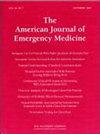Exploring ChatGPT's potential in ECG interpretation and outcome prediction in emergency department
IF 2.7
3区 医学
Q1 EMERGENCY MEDICINE
引用次数: 0
Abstract
Background
Approximately 20 % of emergency department (ED) visits involve cardiovascular symptoms. While ECGs are crucial for diagnosing serious conditions, interpretation accuracy varies among emergency physicians. Artificial intelligence (AI), such as ChatGPT, could assist in ECG interpretation by enhancing diagnostic precision.
Methods
This single-center, retrospective observational study, conducted at Merano Hospital's ED, assessed ChatGPT's agreement with cardiologists in interpreting ECGs. The primary outcome was agreement level between ChatGPT and cardiologists. Secondary outcomes included ChatGPT's ability to identify patients at risk for Major Adverse Cardiac Events (MACE).
Results
Of the 128 patients enrolled, ChatGPT showed good agreement with cardiologists on most ECG segments, excluding T wave (kappa = 0.048) and ST segment (kappa = 0.267). Significant discrepancies arose in the assessment of critical cases, as ChatGPT classified more patients as at risk for MACE than were identified by physicians.
Conclusions
ChatGPT demonstrates moderate accuracy in ECG interpretation, yet its current limitations, especially in assessing critical cases, restrict its clinical utility in ED settings. Future research and technological advancements could enhance AI's reliability, potentially positioning it as a valuable support tool for emergency physicians.
探索 ChatGPT 在急诊科心电图解读和结果预测方面的潜力。
背景:约 20% 的急诊科(ED)就诊者有心血管症状。虽然心电图对诊断严重疾病至关重要,但急诊医生对心电图的解读准确性却参差不齐。人工智能(AI),如 ChatGPT,可以通过提高诊断精确度来协助心电图解读:这项在梅拉诺医院急诊室进行的单中心回顾性观察研究评估了 ChatGPT 与心脏病专家在解读心电图方面的一致性。主要结果是 ChatGPT 与心脏病专家的一致程度。次要结果包括 ChatGPT 识别重大心脏不良事件 (MACE) 风险患者的能力:在 128 名入选患者中,ChatGPT 与心脏病专家在大多数心电图节段上都显示出良好的一致性,但不包括 T 波(kappa = 0.048)和 ST 段(kappa = 0.267)。在危重病例的评估中出现了明显的差异,因为 ChatGPT 将更多患者归类为有 MACE 风险,而不是由医生确定的患者:ChatGPT 在心电图解读方面表现出中等准确性,但其目前的局限性,尤其是在评估危重病例方面,限制了其在急诊室环境中的临床应用。未来的研究和技术进步可以提高人工智能的可靠性,使其成为急诊医生的重要辅助工具。
本文章由计算机程序翻译,如有差异,请以英文原文为准。
求助全文
约1分钟内获得全文
求助全文
来源期刊
CiteScore
6.00
自引率
5.60%
发文量
730
审稿时长
42 days
期刊介绍:
A distinctive blend of practicality and scholarliness makes the American Journal of Emergency Medicine a key source for information on emergency medical care. Covering all activities concerned with emergency medicine, it is the journal to turn to for information to help increase the ability to understand, recognize and treat emergency conditions. Issues contain clinical articles, case reports, review articles, editorials, international notes, book reviews and more.

 求助内容:
求助内容: 应助结果提醒方式:
应助结果提醒方式:


